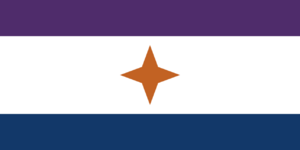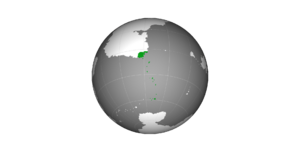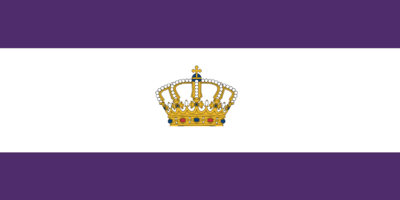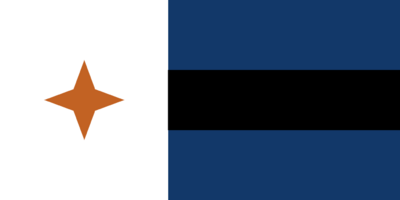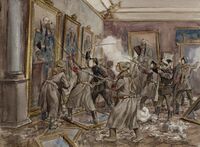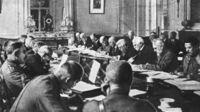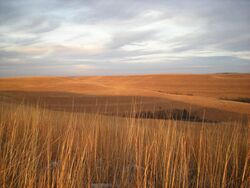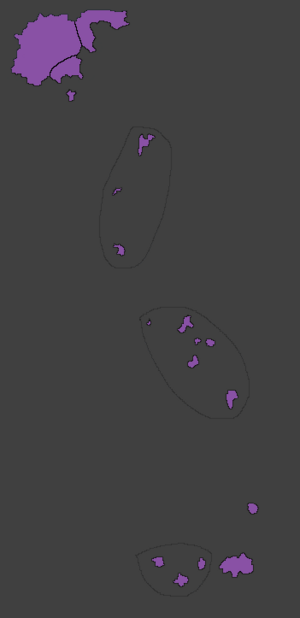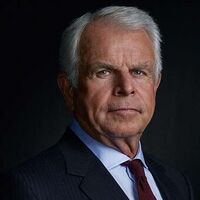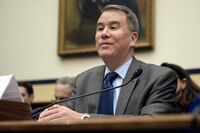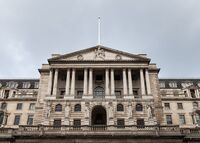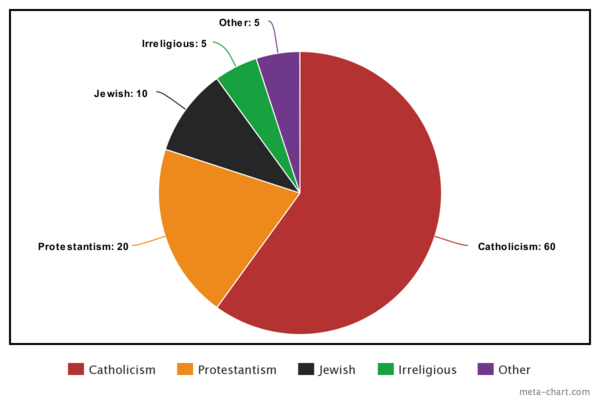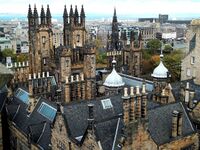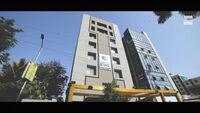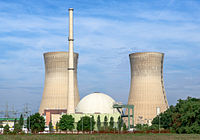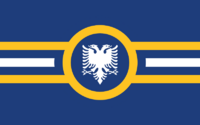The United Duchies of Logon: Difference between revisions
No edit summary |
No edit summary |
||
| (12 intermediate revisions by the same user not shown) | |||
| Line 7: | Line 7: | ||
|national_motto = ''Quoniam Populus Dei et Logon'' (English: For the People of God and Logon) | |national_motto = ''Quoniam Populus Dei et Logon'' (English: For the People of God and Logon) | ||
|national_anthem = ''God's Land'' | |national_anthem = ''God's Land'' | ||
|image_map = | |image_map = | ||
|alt_map = | [[File:Better Globe.png|thumb]] | ||
|map_caption = | |alt_map = Global View | ||
|map_caption = Territory Held by the UDL (Green) | |||
|capital = Victoria | |capital = Victoria | ||
|largest_city = Charlestown | |largest_city = Charlestown | ||
| Line 41: | Line 39: | ||
|established_date3 = August 3rd, 1868 | |established_date3 = August 3rd, 1868 | ||
|established_event4 = Victorian Compromise Constitution | |established_event4 = Victorian Compromise Constitution | ||
|established_date4 = | |established_date4 = April 18th, 1920 | ||
|population_estimate = 32,000,000 | |population_estimate = 32,000,000 | ||
|population_estimate_year = 2020 | |population_estimate_year = 2020 | ||
| Line 66: | Line 64: | ||
Logon consists of nine constituent duchies: Almara, Sulmara, Washin, Firda, Macola, Don, Bemin, Andars, and Coldsland. Their capitals are Almarica, Charlestown, Leeds, Fird, Gozon, Trum, Lavand, Borson, and Snowhil, respectively. All the duchies have their own devolved governments, each with signifigant powers, with such power being guaranteed by the Almarican and Victorian Compromises. The early modern conquest and subsequent annexation of Sulmara by the Kingdom of Almara, followed by the Almaran conquests in a series of wars now called "the Unification Conflicts" between 1850 and 1868 to form the Greater Kingdom of Almara in 1866, and the surrender of Coldsland, Bemin, and Andars in 1866 created the United Duchies of Logon. The UDL's current name was adopted in 1868 to reflect the decentralization of power from the Almaran monarch to the various monarchs, now called dukes, of the constituent duchies. | Logon consists of nine constituent duchies: Almara, Sulmara, Washin, Firda, Macola, Don, Bemin, Andars, and Coldsland. Their capitals are Almarica, Charlestown, Leeds, Fird, Gozon, Trum, Lavand, Borson, and Snowhil, respectively. All the duchies have their own devolved governments, each with signifigant powers, with such power being guaranteed by the Almarican and Victorian Compromises. The early modern conquest and subsequent annexation of Sulmara by the Kingdom of Almara, followed by the Almaran conquests in a series of wars now called "the Unification Conflicts" between 1850 and 1868 to form the Greater Kingdom of Almara in 1866, and the surrender of Coldsland, Bemin, and Andars in 1866 created the United Duchies of Logon. The UDL's current name was adopted in 1868 to reflect the decentralization of power from the Almaran monarch to the various monarchs, now called dukes, of the constituent duchies. | ||
Logon has the world's fourteenth-largest economy by nominal gross domestic product (GDP), and the fourteenth-largest population. It has a high-income economy and a very high human development index rating at 0.900. It was one of the world's first industrialised countries. Logon remains a regional power, with respectable economic, cultural, military, scientific and political influence internationally. While it lacks nuclear weapons, Logon's military has a sizeable navy for a country of its size, and the Logonian | Logon has the world's fourteenth-largest economy by nominal gross domestic product (GDP), and the fourteenth-largest population. It has a high-income economy and a very high human development index rating at 0.900. It was one of the world's first industrialised countries. Logon remains a regional power, with respectable economic, cultural, military, scientific and political influence internationally. While it lacks nuclear weapons, Logon's military has a sizeable navy for a country of its size, and the Logonian Armed Forces are known to have biological and chemical weapons. | ||
==Name== | ==Name== | ||
| Line 112: | Line 110: | ||
The United Duchies is a federation and parliamentary democracy in which the legislative and executive branches are closely connected, though the judicial branch is independent. In the Logonian federalist system, citizens are usually subject to three levels of government: federal, duchy, and local. The local government's duties are commonly split between parish and municipal governments. | The United Duchies is a federation and parliamentary democracy in which the legislative and executive branches are closely connected, though the judicial branch is independent. In the Logonian federalist system, citizens are usually subject to three levels of government: federal, duchy, and local. The local government's duties are commonly split between parish and municipal governments. | ||
The federal government consists of a legislature made up of the House of Dukes and the | The federal government consists of a legislature made up of the House of Dukes and the United Assembly. The House of Dukes is made up of three noblemen or noblewomen per duchy appointed by the dukes of their respective duchies, and is only able to delay legislation. The United Assembly is an elected body using mixed method proportional voting, with 300 seats distributed among the duchies in accordance with population and another 100 seats to be elected by a national party list election. The United Assembly has most formal power, including the ''de facto'' power to appoint the Chancellor, but the House of Dukes can block laws from taking effect. The United Assembly, if a law is blocked, may pass the law again a month later. If the House of Dukes blocks it once more, the United Assembly may hold an election. If the legislation passes after the election, it becomes law anyways. Other than these snap elections, terms are fixed, with elections held every five years. | ||
The executive is in the power of the Chancellor, Monarch, and Cabinet. Formally, the Monarch, currently King Jacob III, appoints a Chancellor after the Popular Assembly gives a formal recommendation. In practice, though this is not required by law, the Monarch simply appoints the | The executive is in the power of the Chancellor, Monarch, and Cabinet. Formally, the Monarch, currently King Jacob III, appoints a Chancellor after the Popular Assembly gives a formal recommendation. In practice, though this is not required by law, the Monarch simply appoints the United Assembly's recommendation. Chancellors are considered to become nobles, with the title Lord/Lady, but this title is only given after the Chancellor's term expires and is not hereditary and the title may be denied by the House of Dukes with the advice of the United Assembly. The Chancellor then will appoint a Cabinet made up of Members of Parliament. The Chancellor must hold the confidence of the United Assembly, but may only serve up to two five year terms, and may be removed in a vote of no confidence. In the event of his death, the Speaker of the United Assembly shall become Chancellor until the United Assembly recommends a new Chancellor to the Monarch. The Monarch must give his assent to any laws passed by the Parliament, but in practice the Monarch gives assent to or vetoes laws based off of the recommendation of the Chancellor, meaning that in essence, the Chancellor wields a veto power over the United Assembly, though a three fifths majority may override such a veto, and it is very rare that a Chancellor survive a motion of no confidence after advising the Monarch to veto legislation. The Monarch is elected by a secret ballot for a life term by all the dukes of the various duchies, and the selected Monarch serves simultaneously as both King/Queen of Logon and Duke/Duchess of their respective duchy. | ||
The High Court is the supreme court of Logon, consisting of 12 justices and 1 President of the High Court. Its justices are automatically considered to become nobles, with the title of Lord/Lady, though this title is not hereditary. The justices, by secret ballot, | The High Court is the supreme court of Logon, consisting of 12 justices and 1 President of the High Court. Its justices are automatically considered to become nobles, with the title of Lord/Lady, though this title is not hereditary. The justices, by secret ballot, select a President of the High Court, who only votes in the event of a tie. Justices are formally appointed by the Monarch on the advice of the Chancellor, but the Chancellor may only advise the Monarch to choose a candidate from a shortlist given to the Chancellor by the High Court, meaning that in practice, the High Court selects its own members. Justices of the high court must retire at the age of 75 or after serving 15 years on the court, whichever comes first. | ||
===Political Divisions=== | ===Political Divisions=== | ||
Logon is divided into nine duchies, each with signifigant autonomy. They are considered | Logon is divided into nine duchies, each with signifigant autonomy. They are considered sovereign in their own right, though in the event of conflict between a duchy's law and national law, the national law wins out. | ||
[[File:Zoomed.png|300px|thumb|right|Unlabeled map of Logonian Duchies]] | |||
{| class="wikitable" | {| class="wikitable" | ||
|- | |- | ||
! Flag !! Duchy !! | ! Flag !! Duchy !! Executive !! Monarch !! Population | ||
|- | |- | ||
| | | | ||
| Line 160: | Line 159: | ||
|} | |} | ||
===Election Method=== | ===Election Method=== | ||
Local governments are commonly conducted via single transferable vote, while the federal government conducts elections through mixed member proportional elections. Five out of the nine duchies (Almara, Sulmara, Firda, Macola, and Don) conduct their elections through this method as well, but three (Washin, Bemin, and Coldsland) simply use proportional representation, where a party's share of the vote translates into seats in the legislature. One duchy, Andars, uses a popular vote to elect a President. All duchies (and the federal government) have their monarch formally "appoint" an executive figure, although in practice the monarch appoints the selection of the legislature. | Local governments are commonly conducted via single transferable vote, while the federal government conducts elections through mixed member proportional elections, with 100 districts electing 3 representatives each are distributed among the duchies according to population and 100 seats coming from a party list. Five out of the nine duchies (Almara, Sulmara, Firda, Macola, and Don) conduct their elections through this method as well, but three (Washin, Bemin, and Coldsland) simply use proportional representation, where a party's share of the vote translates into seats in the legislature. One duchy, Andars, uses a popular vote to elect a President. All duchies (and the federal government) have their monarch formally "appoint" an executive figure, although in practice the monarch appoints the selection of the legislature. | ||
The federal government and all five duchies that use an MMP electoral system compensate parties to ensure a relatively proportional legislature. The federal government requires a party's share of the seats to be within 5% of the popular vote share for that party, with three exceptions being if the party took a majority of the seats but a minority of the popular vote, if a party took a minority of seats but a majority of the popular vote, or if a party came in one place in the popular vote but another in terms of seats. All duchies that use MMP have a similar rule, although the vote difference ranges from 3% to 10%, depending on the duchy. | The federal government and all five duchies that use an MMP electoral system compensate parties to ensure a relatively proportional legislature. The federal government requires a party's share of the seats to be within 5% of the popular vote share for that party, with three exceptions being if the party took a majority of the seats but a minority of the popular vote, if a party took a minority of seats but a majority of the popular vote, or if a party came in one place in the popular vote but another in terms of seats. All duchies that use MMP have a similar rule, although the vote difference ranges from 3% to 10%, depending on the duchy. | ||
| Line 172: | Line 171: | ||
In Logonian political culture, the right wing National Party is considered "conservative", the left wing Liberal Party is considered "liberal" and the Center Party is considered "centrist". The duchies of the North and Mainland, known as "blue duchies", are relatively conservative. The "red duchies" of the South are relatively liberal. There are no "orange duchies" that vote Center, but many districts have been called "orange" in the past. | In Logonian political culture, the right wing National Party is considered "conservative", the left wing Liberal Party is considered "liberal" and the Center Party is considered "centrist". The duchies of the North and Mainland, known as "blue duchies", are relatively conservative. The "red duchies" of the South are relatively liberal. There are no "orange duchies" that vote Center, but many districts have been called "orange" in the past. | ||
National Party member Christopher O'Curry, whose party won a majority in the 2015 election, is serving as the 12th Chancellor of the United Duchies. Leadership in the Popular Assembly includes Center Party Speaker | National Party member Christopher O'Curry, whose party won a majority in the 2015 election, is serving as the 12th Chancellor of the United Duchies. Leadership in the Popular Assembly includes Center Party Speaker Sarah Alderman, Liberal speaker pro tempore Charles di Maggio, Majority Leader James Blackwell, and Minority Leader Sarah Bagdaw. Leadership in the House of Dukes includes Speaker of the House King Jacob III, but the position, much like the House of Dukes itself, is ceremonial. | ||
===Law and Justice=== | ===Law and Justice=== | ||
Law enforcement in Logon is primarily the responsibility of local police departments and sheriff's offices, with duchy royal police providing broader services. The Victoria Police Department (VPD) is the largest in the country. Federal agencies such as the Royal Investigation Agency (RIA) and the U.D. Marshals Service have specialized duties, including protecting civil rights, national security and enforcing U.D. federal courts' rulings and federal laws.At the federal level and in every duchy, a legal system operates on a common law. Duchy courts conduct most criminal trials while federal courts handle certain designated crimes as well as certain appeals from the duchy criminal courts. | Law enforcement in Logon is primarily the responsibility of local police departments and sheriff's offices, with duchy royal police providing broader services. The Victoria Police Department (VPD) is the largest in the country. Federal agencies such as the Royal Investigation Agency (RIA) and the U.D. Marshals Service have specialized duties, including protecting civil rights, national security and enforcing U.D. federal courts' rulings and federal laws.At the federal level and in every duchy, a legal system operates on a common law. Duchy courts conduct most criminal trials while federal courts handle certain designated crimes as well as certain appeals from the duchy criminal courts. | ||
| Line 182: | Line 181: | ||
[[File:Secretary of State.jpg|200px|thumb|The current Secretary of Foreign Affairs, Dominick Williams, in office since 2015]] | [[File:Secretary of State.jpg|200px|thumb|The current Secretary of Foreign Affairs, Dominick Williams, in office since 2015]] | ||
===Military=== | ===Military=== | ||
''His'' Majesty's Armed Forces consist of four professional service branches: the | ''His'' Majesty's Armed Forces consist of four professional service branches: the United Duchies Navy and United Duchies Marine Core (forming the UD Naval Service), the Army of Logon, the Royal Guard, and the United Duchies Air Force. The armed forces of Logon are managed by the Department of Defense and controlled by the National Military Council, chaired by the Secretary of Defense. The Commander-in-Chief is the Chancellor, to whom members of the forces swear an oath of allegiance. The Armed Forces are charged with protecting the UDL and its territories, promoting the UDL's global security interests and supporting international peacekeeping efforts. They are active and regular participants in FCN peacekeeping and other worldwide coalition operations. Overseas garrisons and facilities are maintained in the Washington Republic, among other nations. | ||
[[File:Secretary of Defense.jpg|200px|thumb|left|Secretary of Defense John Rhodes, in office since 2015.]] | [[File:Secretary of Defense.jpg|200px|thumb|left|Secretary of Defense John Rhodes, in office since 2015.]] | ||
==Economy== | ==Economy== | ||
===Overview=== | ===Overview=== | ||
| Line 192: | Line 192: | ||
The service sector makes up roughly 60% of the Logonian economy, with trade making up 15%, manufacturing and mining making up 13%, and agriculture making up 12%. Industry and mining is mainly concentrated in the mainland with mines being located in the desert ore veins. Agriculture is mostly tropical crops grown in the ST Islands with the NF Islands being mostly fishing. | The service sector makes up roughly 60% of the Logonian economy, with trade making up 15%, manufacturing and mining making up 13%, and agriculture making up 12%. Industry and mining is mainly concentrated in the mainland with mines being located in the desert ore veins. Agriculture is mostly tropical crops grown in the ST Islands with the NF Islands being mostly fishing. | ||
Logon has a balanced budget, with a | Logon has a balanced budget, with a national debt of 500 million USD. | ||
==Demographics== | ==Demographics== | ||
Logon is a diverse country with nine separate ethnic and language groups. Due to the close relations of these ethno-language groups, some demographers dispute their separate classification, calling the different groups merely different dialects of Logonian. | Logon is a diverse country with nine separate ethnic and language groups. Due to the close relations of these ethno-language groups, some demographers dispute their separate classification, calling the different groups merely different dialects of Logonian. | ||
| Line 254: | Line 255: | ||
Logonian national philosophy is one that closely follows Locke and other Enlightenment thinkers. Christian thought is a major influence, as is Liberalism and Republicanism. Logonians have been described to be fiercely libertarian in most aspects of social politics, but more interventionist in economic politics. | Logonian national philosophy is one that closely follows Locke and other Enlightenment thinkers. Christian thought is a major influence, as is Liberalism and Republicanism. Logonians have been described to be fiercely libertarian in most aspects of social politics, but more interventionist in economic politics. | ||
{{ | {{RCN topics}} | ||
[[Category: | [[Category:Republic of Conservative Nations]] | ||
[[Category: | [[Category:RCN Nations]] | ||
Latest revision as of 03:56, 29 May 2020
The United Duchies of Logon | |
|---|---|
|
Flag | |
| Motto: Quoniam Populus Dei et Logon (English: For the People of God and Logon) | |
| Anthem: God's Land | |
Territory Held by the UDL (Green) | |
| Capital | Victoria |
| Largest city | Charlestown |
| Official languages | Logonian Basic |
| Recognised national languages | Logonian Basic |
| Recognised regional languages | Almaran, Sulmaran, Firdan, Washingese, and several other regional languages |
| Ethnic groups (2015 Census) | 20% Almaran, 18% Sulmaran, 14% Firdan, 14% Washingese, 34% Other |
| Demonym(s) | Logonian |
| Government | Federal Parliamentary Constitutional Monarchy |
• Monarch and Presider of the House of Dukes | King Jacob III |
• Chancellor | Christopher O'Curry |
• President of the High Court | Vincent C. Falman |
• Speaker of the Assembly | Sarah Alderman |
| Legislature | National Parliament |
| House of Dukes | |
| Popular Assembly | |
| Formation | |
• Monarchy Act | March 6th, 1692 |
• Unification Conflicts | 1850-1866 |
• Almarican Compromise Constitution | August 3rd, 1868 |
• Victorian Compromise Constitution | April 18th, 1920 |
| Population | |
• 2020 estimate | 32,000,000 |
• 2015 Census census | 31,800,000 |
| GDP (nominal) | 2020 estimate |
• Total | 1,280,000,000,000 USD |
• Per capita | 40,000 USD |
| HDI (2015) | .900 very high |
| Currency | Logonian Mark |
| Time zone | UTC-6 (LBT) |
| Date format | (mm-dd-yyyy) |
| Driving side | right |
| Calling code | +18 |
| Internet TLD | .lg |
Logon, formally the United Duchies of Logon is a sovereign country located off and on the southern coast of the Stratean mainland and northern Frigon mainland. Logon includes the islands of the South Tenific Island Chain, the Northwestern Frigo Islands, and a sizeable portion of land on the Stratean mainland. Almara and Sulmara share a land border with the Washingtonian Republic. Otherwise, the United Kingdom is surrounded by the South Tenific and Rochian Oceans, with the island chains belonging to Logon commonly thought as the "border" between the two oceans.
Logon is a federal parliamentary democracy and constitutional monarchy. The current monarch is King Jacob III, who has reigned since 2018, making him Logon's second head of state not from the Almaran line. Logon's capital is Victoria, a global city and financial center with an urban area population of 1.2 million. Other major cities include Charlestown, Anderson, Leeds, Fird, and Almarica.
Logon consists of nine constituent duchies: Almara, Sulmara, Washin, Firda, Macola, Don, Bemin, Andars, and Coldsland. Their capitals are Almarica, Charlestown, Leeds, Fird, Gozon, Trum, Lavand, Borson, and Snowhil, respectively. All the duchies have their own devolved governments, each with signifigant powers, with such power being guaranteed by the Almarican and Victorian Compromises. The early modern conquest and subsequent annexation of Sulmara by the Kingdom of Almara, followed by the Almaran conquests in a series of wars now called "the Unification Conflicts" between 1850 and 1868 to form the Greater Kingdom of Almara in 1866, and the surrender of Coldsland, Bemin, and Andars in 1866 created the United Duchies of Logon. The UDL's current name was adopted in 1868 to reflect the decentralization of power from the Almaran monarch to the various monarchs, now called dukes, of the constituent duchies.
Logon has the world's fourteenth-largest economy by nominal gross domestic product (GDP), and the fourteenth-largest population. It has a high-income economy and a very high human development index rating at 0.900. It was one of the world's first industrialised countries. Logon remains a regional power, with respectable economic, cultural, military, scientific and political influence internationally. While it lacks nuclear weapons, Logon's military has a sizeable navy for a country of its size, and the Logonian Armed Forces are known to have biological and chemical weapons.
Name
The word Logon comes from the name of an ancient empire that existed in the early first century BC to the fourth century AD, covering what is now most of mainland Logon and southern portions of Washington Republic, with considerable control of the South Tenific Island Chain. The empire was broken up by internal conflicts, disease, and economic poverty and ceased to exist by the beginning of the fourth century AD. When Logon was unified, its former name was adopted as a gesture of goodwill by the ruling Almarans.
History
Early History
The first anatomically modern humans began settling parts of what is now Almara, Washin, and Sulmara roughly 2500 years ago. These disparate tribes unified under a common leader known as Emperor Alm, whose name likely gave rise to the term "Almara", in the year 86 BC. The Empire of Logon ruled over what is now mainland Logon, portions of the Washington Republic, and most of the South Tenific Island Chain, though communities formed by dissidents or migrants populated much of the lower islands as the years went by.
The Empire's economic growth began to slow in the early third century AD and Logon's empire began to falter under the weight of a heavy handed bureaucracy and a generation of monarchs unfit to lead. The Empire simply ceased to exist at some point in the early fourth century AD. The year 388, the death of Emperor Clau, is commonly cited as the end of the Empire, which collapsed into civil war in the years following his death.
Over the course of the next 1500 years, nine nations arose from the ashes of the Empire. Each of these nations, destined to be duchies, had gone through times of crisis and revolution, war and peace, and authoritarianism and freedom. By the early 1700s, these nations would all be monarchies, though some more absolute than others.
When the Kingdom of Almara became belligerent, the stage was set for a new chapter of Logonian history.
Unification Wars
In 1850, King Eric the Conquerer of Almara was crowned. The day following his cornoration, January 18th, he ordered his troops into neighboring Sulmara. In a relatively long war, only ending in 1856, Almaran troops conquered the Sulmaran capital, and captured Queen Elizabeth III of Sulmara, who promptly surrendered. The Kingdoms of Washin and Firda, fearing Almaran invasion, agreed to join the Almaran Kingdom as autonomous territories. This arrangement, accepted in 1859, provided the basis for the Almarican Compromise.
In 1862 Almara began a series of conflicts, warring with Macola and Don, both concentrated on a few islands, and by 1864 the remaining holdouts were eliminated, and Almara controlled most of what is now modern Logon. However, three holdouts remained, and stubborn resistance by Bemin, Coldsland, and Andars, spread out much further than Almara's previous enemies were, led to a stalemate. Bemin, Coldsland, and Andars formed a coalition known as "the Southern Coalition" to fight off the Almarans. The mighty Almaran armies were rendered useless by the superior Coalition Navy.
This stalemate continued until the Peace of Almarica, where the Coalition agreed to join the Almarian Kingdom (that was by then renamed the Greater Logonian Empire) in exchange for politial autonomy for the various kingdoms conquered by the Almarian King. In exchange, the Almarian monarch would be the monarch of the entire nation with the various monarchs of conquered states becoming dukes within their own realms. This political situation, known as the Almarican Era, would remain in place until 1920.
Civil War and the Modern Era
By 1917, the United Duchies was beginning to falter. For most of the forty nine years between 1868 and 1917, the Almarian monarchs (King Winston I, King Winston II, and Queen Charlotte I) had ruled with a light hand to placate dissatisfied dukes, and in exchange these dukes helped to put down revolts by the commoners. However, with the accession of King Lucas IV, the tension finally grew into war. Commoners in Coldsland, Bemin, and Andars seized a Logonian Royal Army supply depot and declared independence to establish a state based off of republican, not monarchial, ideals.
The initial revolt spread, and soon all duchies aside from Almara, Sulmara, Fird, and Washin were facing massive rebellions. Royal soldiers of the Logonian National Army were called in, as local troops sided with the Republicans. Facing full scale revolution, the country settled in for three years of brutal fighting. The war escalated during the decisive Battle of Almarica, where the Royal Palace was sacked by the Republicans and the royal portraits were destroyed. The Sacking of the Palace angered the already delusional Lucas IV, who ordered the burning of any town found in revolt.
The burning of many towns and villages led to a loss of support for Lucas IV, and he died on August 8th, 1919 of a heart attack. His successor, Queen Charlotte II, chose to agree to a mediated peace with the Republicans. In exchange for the monarchy being allowed to stay, all political power would be de facto concentrated in elected bodies that would be elected by the people. The Republicans agreed to this Compromise Constitution, and peace was achieved on April 18th, 1920, with General Robert Blackstone being elected as the first Chancellor.
Since then, Logon has become a wealthy and parliamentary democracy, with the royal family slowly regaining popularity among the common people, with all real power being concentrated in an elected National Parliament and Chancellor.
Geography
Mainland Logon
Mainland Logon is dry and arid on the interior, with much of the environment being desert or steppes. A mountain range along the east of the mainland separates this dry desert from the coast, where the majority of the population lives. These coastal areas are warm and wet nearly year around with temperatures in the seventies and eighties most days.
South Tenific Island Chain
These islands are mostly flat with warm and wet weather year round in the northern islands. The rural population allows for tropical crops to be grown easily. However, the southern islands are cooler and drier, but with mild winters and warm summers.
Northwestern Frigon Islands
The islands in the Northwestern Frigon Islands are cool and wet, with mild summers and cold winters. Snow is common and most of the islands are populated by dense pine forests.
Government and Politics
The United Duchies is a federation and parliamentary democracy in which the legislative and executive branches are closely connected, though the judicial branch is independent. In the Logonian federalist system, citizens are usually subject to three levels of government: federal, duchy, and local. The local government's duties are commonly split between parish and municipal governments.
The federal government consists of a legislature made up of the House of Dukes and the United Assembly. The House of Dukes is made up of three noblemen or noblewomen per duchy appointed by the dukes of their respective duchies, and is only able to delay legislation. The United Assembly is an elected body using mixed method proportional voting, with 300 seats distributed among the duchies in accordance with population and another 100 seats to be elected by a national party list election. The United Assembly has most formal power, including the de facto power to appoint the Chancellor, but the House of Dukes can block laws from taking effect. The United Assembly, if a law is blocked, may pass the law again a month later. If the House of Dukes blocks it once more, the United Assembly may hold an election. If the legislation passes after the election, it becomes law anyways. Other than these snap elections, terms are fixed, with elections held every five years.
The executive is in the power of the Chancellor, Monarch, and Cabinet. Formally, the Monarch, currently King Jacob III, appoints a Chancellor after the Popular Assembly gives a formal recommendation. In practice, though this is not required by law, the Monarch simply appoints the United Assembly's recommendation. Chancellors are considered to become nobles, with the title Lord/Lady, but this title is only given after the Chancellor's term expires and is not hereditary and the title may be denied by the House of Dukes with the advice of the United Assembly. The Chancellor then will appoint a Cabinet made up of Members of Parliament. The Chancellor must hold the confidence of the United Assembly, but may only serve up to two five year terms, and may be removed in a vote of no confidence. In the event of his death, the Speaker of the United Assembly shall become Chancellor until the United Assembly recommends a new Chancellor to the Monarch. The Monarch must give his assent to any laws passed by the Parliament, but in practice the Monarch gives assent to or vetoes laws based off of the recommendation of the Chancellor, meaning that in essence, the Chancellor wields a veto power over the United Assembly, though a three fifths majority may override such a veto, and it is very rare that a Chancellor survive a motion of no confidence after advising the Monarch to veto legislation. The Monarch is elected by a secret ballot for a life term by all the dukes of the various duchies, and the selected Monarch serves simultaneously as both King/Queen of Logon and Duke/Duchess of their respective duchy.
The High Court is the supreme court of Logon, consisting of 12 justices and 1 President of the High Court. Its justices are automatically considered to become nobles, with the title of Lord/Lady, though this title is not hereditary. The justices, by secret ballot, select a President of the High Court, who only votes in the event of a tie. Justices are formally appointed by the Monarch on the advice of the Chancellor, but the Chancellor may only advise the Monarch to choose a candidate from a shortlist given to the Chancellor by the High Court, meaning that in practice, the High Court selects its own members. Justices of the high court must retire at the age of 75 or after serving 15 years on the court, whichever comes first.
Political Divisions
Logon is divided into nine duchies, each with signifigant autonomy. They are considered sovereign in their own right, though in the event of conflict between a duchy's law and national law, the national law wins out.
| Flag | Duchy | Executive | Monarch | Population |
|---|---|---|---|---|
| Almara | Chancellor Charles Vonman | Duchess Elizabeth II | 9.8 million | |
| Sulmara | Speaker Samuel Clem | Duke Jacob III | 7.3 million | |
| Washin | Premier Lincoln Todds | Duke Eric VI | 5.8 million | |
| Firda | Speaker Erica Biconti | Duchess Sadie | 4.5 million | |
| Macola | Secretary John Ericsson | Duchess Charlotte V | 1.5 million | |
| Don | Chancellor Albert Raymond. | Duke George III | 1.25 million | |
| Bemin | Premier Jessia Parks | Duke Malcom II | 0.75 million | |
| Andars | President Hannah Little | Duke John II | 0.6 million | |
| Coldsland | Premier Warren Bagwell | Duchess Mary | 0.5 million |
Election Method
Local governments are commonly conducted via single transferable vote, while the federal government conducts elections through mixed member proportional elections, with 100 districts electing 3 representatives each are distributed among the duchies according to population and 100 seats coming from a party list. Five out of the nine duchies (Almara, Sulmara, Firda, Macola, and Don) conduct their elections through this method as well, but three (Washin, Bemin, and Coldsland) simply use proportional representation, where a party's share of the vote translates into seats in the legislature. One duchy, Andars, uses a popular vote to elect a President. All duchies (and the federal government) have their monarch formally "appoint" an executive figure, although in practice the monarch appoints the selection of the legislature.
The federal government and all five duchies that use an MMP electoral system compensate parties to ensure a relatively proportional legislature. The federal government requires a party's share of the seats to be within 5% of the popular vote share for that party, with three exceptions being if the party took a majority of the seats but a minority of the popular vote, if a party took a minority of seats but a majority of the popular vote, or if a party came in one place in the popular vote but another in terms of seats. All duchies that use MMP have a similar rule, although the vote difference ranges from 3% to 10%, depending on the duchy.
In the first situation, if Party A takes 51% of the seats yet wins 49% of the popular vote, it will be given less party lists seats to compensate, even though the difference is within 5%. In the second situation, if Party A takes 51% of the popular vote but 49% of the seats, it will be given more party list seats to compensate, even though the difference is within 5%. In the third situation, if Party A came in third place by the popular vote but second place in terms of seats, it will be given less party list seats in order to be third in terms of seats held.
Parties
Logon has operated under what has been called a "two and a half" party system.
For elective offices at most levels, duchy-administered primary elections choose the major party nominees for subsequent general elections. Since the general election of 1965, the major parties have been the National Party, founded in 1960, and the Liberal Party, founded in 1923. The Center Party, founded in 1992, takes a signifigant share of the vote, but is never larger than third place. Since the Civil War, only one third-party parliamentarian has become Chancellor-Andrew Locke for 1975-1985. The Chancellor is chosen by the Popular Assembly.
In Logonian political culture, the right wing National Party is considered "conservative", the left wing Liberal Party is considered "liberal" and the Center Party is considered "centrist". The duchies of the North and Mainland, known as "blue duchies", are relatively conservative. The "red duchies" of the South are relatively liberal. There are no "orange duchies" that vote Center, but many districts have been called "orange" in the past.
National Party member Christopher O'Curry, whose party won a majority in the 2015 election, is serving as the 12th Chancellor of the United Duchies. Leadership in the Popular Assembly includes Center Party Speaker Sarah Alderman, Liberal speaker pro tempore Charles di Maggio, Majority Leader James Blackwell, and Minority Leader Sarah Bagdaw. Leadership in the House of Dukes includes Speaker of the House King Jacob III, but the position, much like the House of Dukes itself, is ceremonial.
Law and Justice
Law enforcement in Logon is primarily the responsibility of local police departments and sheriff's offices, with duchy royal police providing broader services. The Victoria Police Department (VPD) is the largest in the country. Federal agencies such as the Royal Investigation Agency (RIA) and the U.D. Marshals Service have specialized duties, including protecting civil rights, national security and enforcing U.D. federal courts' rulings and federal laws.At the federal level and in every duchy, a legal system operates on a common law. Duchy courts conduct most criminal trials while federal courts handle certain designated crimes as well as certain appeals from the duchy criminal courts.
Foreign Relations
Logon has an established structure of foreign relations. It is a member of the Federation of Conservative Nations. Almost all countries have embassies in Victoria, and many have consulates around the country. Likewise, nearly all nations host Logonian diplomatic missions. However, the COT Corporation does not have formal diplomatic relations with Logon, as the nation refuses to recognize corporate authority over territory. Logon has a "Special Relationship" with the Washington Republic and strong ties with Gagium and several other Stratean countries.
Foreign policy is determined by the Chancellor and is executed by the Secretary of Foreign Affairs.
Military
His Majesty's Armed Forces consist of four professional service branches: the United Duchies Navy and United Duchies Marine Core (forming the UD Naval Service), the Army of Logon, the Royal Guard, and the United Duchies Air Force. The armed forces of Logon are managed by the Department of Defense and controlled by the National Military Council, chaired by the Secretary of Defense. The Commander-in-Chief is the Chancellor, to whom members of the forces swear an oath of allegiance. The Armed Forces are charged with protecting the UDL and its territories, promoting the UDL's global security interests and supporting international peacekeeping efforts. They are active and regular participants in FCN peacekeeping and other worldwide coalition operations. Overseas garrisons and facilities are maintained in the Washington Republic, among other nations.
Economy
Overview
The UDL has a partially regulated market economy. Based on market exchange rates, the UDL is today the fourteenth-largest economy in the world. HM Treasury, led by the Secretary of the Treasury, is responsible for developing and executing the government's public finance policy and economic policy. The Bank of Almara is the UDL's central bank and is responsible for issuing notes and coins in the nation's currency, the mark. Since 1997 the Bank of Almara's Monetary Policy Committee, headed by the Governor of the Bank of Almara, has been responsible for setting interest rates at the level necessary to achieve the overall inflation target for the economy that is set by the Chancellor and Secretary of the Treasury each year.
The service sector makes up roughly 60% of the Logonian economy, with trade making up 15%, manufacturing and mining making up 13%, and agriculture making up 12%. Industry and mining is mainly concentrated in the mainland with mines being located in the desert ore veins. Agriculture is mostly tropical crops grown in the ST Islands with the NF Islands being mostly fishing.
Logon has a balanced budget, with a national debt of 500 million USD.
Demographics
Logon is a diverse country with nine separate ethnic and language groups. Due to the close relations of these ethno-language groups, some demographers dispute their separate classification, calling the different groups merely different dialects of Logonian.
Logonian Basic is the official language, and is mostly formal, used only for legislation, academia, or other similar settings, rather than as a lingua franca.
Ethno-Language Groups
| Ethno-Language Group | Duchy of Origin | Share of Population |
|---|---|---|
| Almaran | Almara | 20% |
| Sulmaran | Sulmara | 18% |
| Firdan | Firda | 14% |
| Washinian/Washingese | Washin | 14% |
| Macolan | Macola | 10% |
| Donian | Don | 9% |
| Bemin | Bemin | 7% |
| Andarson | Andars | 4% |
| Coldslander | Coldsland | 4% |
Census
A census is conducted by the Royal Census Agency every ten years, the next census will be in 2025.
Religion
Religion is a guranteed freedom. Most Logonians are Catholic, but some, especially in the South, are Protestant. A signifigant Jewish minority also exists on the Logonian mainland.
Education
Education in the United Duchies is a devolved matter, with each duchy having a separate education system.
Considering the four systems together, about 38 per cent of the Logonian population has a university or college degree, which is among the highest percentages in not only Stratea but the world as a whole.
Healthcare
Healthcare in Logon is a devolved matter and each duchy has its own system of private and publicly funded health care. Public healthcare is provided to all UDL citizens and is mostly free at the point of need, being paid for from general taxation. The FCN, in 2010, ranked the provision of healthcare in Logon as high quality with decently equal access for all citizens.
Regulatory bodies are organised on a federal basis such as the General Medical Council, the Parenting Council and non-governmental-based, such as the Royal Colleges. Political and operational responsibility for healthcare lies with the executives of each duchy. Each Duchy Health Service has different policies and priorities, resulting in contrasts in funding usage, but all duchies must meet certain standards.
Infrastructure
Transportation
Personal transportation is dominated by automobiles, which operate on a network of two thousand miles of public roads, including one of the world's most extensive highway systems. Logon has a medium rate of per-capita vehicle ownership in the world, with 250 vehicles per 1,000 Logonians (2016). About 72% of vehicles are sedans or SUVs. However, for most long range trips, Logon's population is serviced by a massive rail and ferry system, connecting most major cities and islands together. Flights are present to link the North to South, though ferry options do exist.
The maintaining of public transport is primarily the responsibility of the duchy governments utilizing funding by the federal government. Most airports and seaports are publicly owned by the government that constructed it, but most shipping and transport services are privately owned.
Energy
Logon is in the midst of a transititon from fossil fuels to nuclear and solar power. Solar is mostly used on the mainland, which has the space and sunlight to support such a power grid. Nuclear is used more and more the further south one travels.
Water Supply and Sanitation
Water sanitation is maintained by duchy governments, and the 2015 census found that 99.7% of all Logonians have access to clean water.
Culture
The culture of Logon has been influenced by many factors including: the nation's island status; its history as a western liberal democracy and absolute monarchy; as well as being a political union of nine duchies, with each preserving elements of distinctive traditions, customs and symbolism.
Cuisine
Logonian cuisine varies by duchy. The mainland duchies have the space and capacity to consume livestock, and frequently do, while the southern island duchies consume fish and other forms of seafood. Tropical fruits are grown throughout the nation, and are common in many dishes.
Media
The LBC, founded in 1922, is the UDL's publicly funded radio, television and Internet broadcasting corporation, and is one of the oldest and largest broadcasters in the world. It operates numerous television and radio stations in the UDL and abroad and its domestic services are funded by the federal government. Other major players in the UK media include Duchy TV, which operates 11 of the 15 regional television broadcasters that make up the DTV Network, and the Capital News Corporation, which owns a number of national newspapers through Capital News International such as the most popular paper, The Daily Teller, and the longest-established daily "broadsheet" The Times, as well as holding a large stake in satellite broadcaster Logon Sky Broadcasting. Victoria dominates the media sector in the UDL: national newspapers and television and radio are largely based there, although Charlestown is also a significant national media centre. Leeds, Fird, and Almarica, are important centres of newspaper and broadcasting production in their respective duchies. The UDL publishing sector, including books, directories and databases, journals, magazines and business media, newspapers and news agencies, has a combined turnover of around 40 million USD and employs around 100,000 people.
Political Values and Philosophy
Logonian national philosophy is one that closely follows Locke and other Enlightenment thinkers. Christian thought is a major influence, as is Liberalism and Republicanism. Logonians have been described to be fiercely libertarian in most aspects of social politics, but more interventionist in economic politics.
